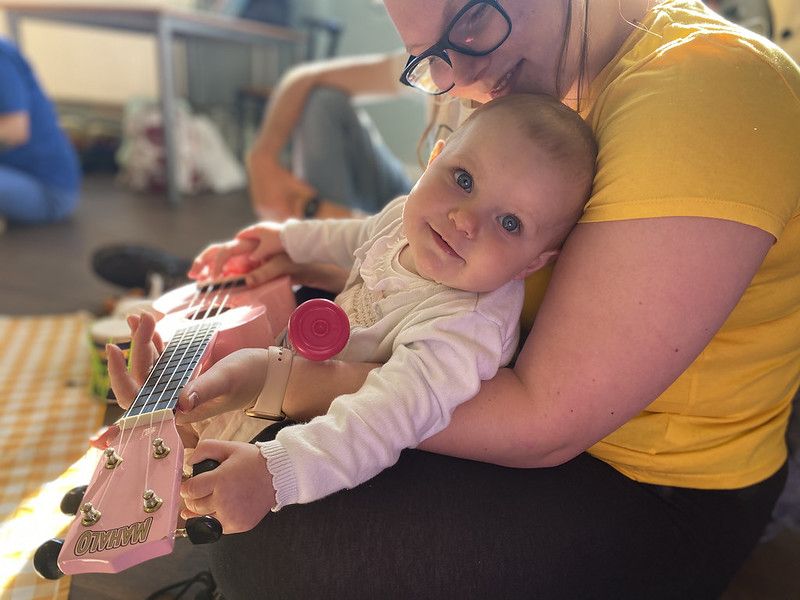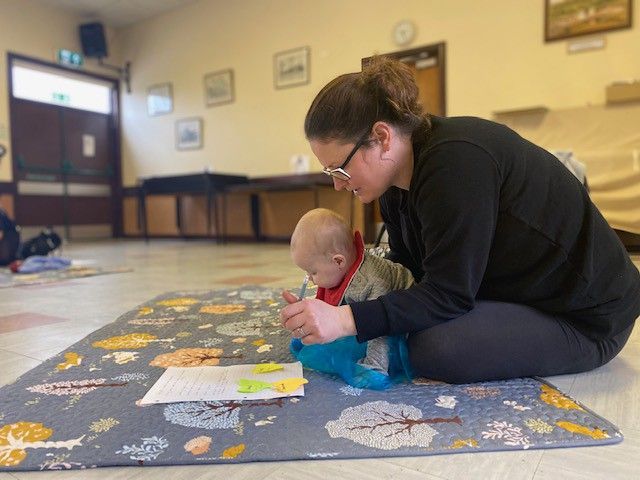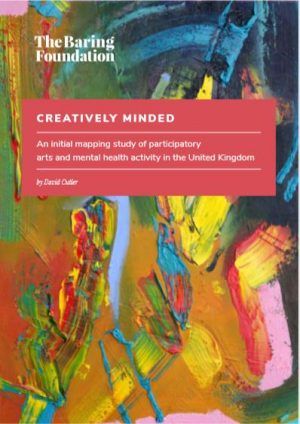Perinatal mental health problems (see useful information from Mind on the range of problems women experience) affect a lot of new and expectant mums – up to 27%. That’s a lot of women and as a funder of arts for people with mental health problems, we are interested in what the creative health sector is offering to them. The answer so far is (just) a handful of wonderful projects, which are explored below.
The power of music
The most prevalent art form (albeit from a small selection of projects) is music and singing. Perhaps linked, perhaps not, is that the impact of music on perinatal mental health is the only area that has been subjected to a randomised controlled trial (RCT) by the Royal College of Music and Imperial College London in 2017. The Music and Motherhood study investigated the impact of a 10-week singing programme on post-natal depression (PND) symptoms compared to the same of (1) usual care and (2) social and play activity. After 6 weeks, results showed a 35% reduction in symptoms of PND, with 67% no longer showing moderate to severe symptoms. By 10 weeks, this was 41% and 73% respectively. The singing programme saw improvement in symptoms one month earlier than the control groups.
The Music and Motherhood study has been operationalised by arts organisation Breathe ahr across London into the Melodies for Mums programme, and has reached 1,000 new mothers since 2017, with sessions continuing to take place in Southwark, Wandsworth, Lambeth, Tower Hamlets and online.
“Melodies for Mums holds a special place in my heart. It lifted me out of the place I was in, which was quite a low state. Now I’m not in it, I can’t quite remember the ins and outs of how I felt after my son was born, but I remember how Melodies for Mums made me feel. That’s how special this programme is to me.”
Jenni
At a similar scale, is Liverpool Philharmonic’s Music and Health Programme which has been working with Mersey Care NHS Foundation Trust’s Perinatal Mental Health Services (PIMS) since 2018, a strand of a 16-year partnership which runs music activities in an impressive range of community and inpatient mental health settings.
The ‘Music, Mums and Little Ones’ programme works with mums engaging in secondary PIMS services. The 6-week programmes are referral-only and engage small groups of around 8 mums supported by a family support worker. They also have a social prescribing programme for mothers with a lower level of need, which receives referrals from a range of professionals, such as link workers, midwives and GPs and some self-referrals. Many of these sessions take place in libraries and community spaces, which has been particularly successful. Virtually all participants report increased confidence and feeling closer to their babies after the sessions.
“This group has enabled me to get out with my baby and watch him enjoy an activity I would not have accessed.”
Music, Mums and Little Ones participant
Another large-scale music project is Live Music Now’s (LMN) wonderful Lullaby programme based on a model developed by Carnegie Hall in the USA which has been tried in a number of different settings, including healthcare and prisons (see Irene Taylor Trust in the UK).
Since 2022 LMN have delivered 30 Lullaby projects across England and Wales, with over 430 participants, working with a wide range of health partners including South West Yorkshire NHS Trust, Alder Hey Hospital and Cheshire and Merseyside Maternity NHS Network.

Lullaby Cymru has been an area of strength with 20 projects across Wales since 2021, seed funded by the Arts Council of Wales and working with various partners including health service providers. Projects have taken place in hospitals and in the community. In bilingual sessions, which combine both group work and individual composition, mums compose a lullaby for their child, which is then recorded and shared at a celebration day for friends and family.
You can listen to some of the lullabies here. New projects are in development with NHS partners in Essex and Medway.
The Baring Foundation has also funded Yaram Arts in London to develop a singing programme for mums with perinatal mental health problems from the Global Majority. The initial plan was to adapt the Singing Mamas method, but consultation suggested a bespoke approach would work better, and they have since been partnering with South East London Mind’s Mindful Mums peer support groups, with Singing Mamas as consultants, and specifically their Diversity Matters group for Global Majority mums. Yaram Arts are hoping to codify their programme in a resource and to develop similar projects with other Global Majority communities.
Beyond music
A handful of other organisations we know about are using other art forms. The beautiful Holburne Museum in Bath has recently piloted a visual arts group for new mums called New Mums Sanctuary. These sessions are aimed at mums with mild to moderate mental health problems, as well as experiences such as isolation, difficulty transitioning to motherhood and birth trauma. Mums are mostly referred by other services such as health visitors and midwives or other services and activities have included making sensory bags with appliqué and singing.
Also using visual arts is Arts for Recovery (ARC), the excellent and specialist visual arts and mental health organisation in Stockport, which has two groups for mums – Creative Mums and Mums Meet and Make. The Art House in Wakefield has also run a Maternal Journal project which uses creative journalling to support wellbeing in pregnancy and new motherhood.
Another Liverpool organisation – Liverpool Lighthouse – has run a drama project for mums who are refugees, which resulted in a theatre piece that highlighted the experiences of pregnant women in the asylum system. This work has been performed at the local women’s hospital and for the decision makers and commissioners for Cheshire and Merseyside NHS and social care services. It is now being recorded as a film to be used in training for all midwives in Liverpool, with other Trusts interested in using it.
Partnering with the NHS
As mentioned above, arts organisations partner with NHS services in various ways – with funding being the holy and unusual grail. Of particular note is Aneurin Bevan University Health Board in Wales, which ran a three-year multi-art form programme for mums engaged with perinatal mental health services. The project was a co-production between artists, clinicians, peer mentors and managed by the Health Board’s Arts in Health team, which is supported by the NHS, with project funding from ‘Arts and Minds’, an Arts Council of Wales and Baring Foundation joint fund.
Participants were referred by Gwent Parent Infant Mental Health Services, and sessions were supported by a psychologist and peer mentors.

Designing a project
We asked each organisation what they’d say to an organisation like themselves considering setting up a creative programme for mothers with perinatal mental health problems. Here are some of the thoughts they had:
- Organisations have thought long and hard about group size. 6-10 mums in a group seems standard. Some projects specify it’s just mums and babies in the sessions; others like Aneurin Bevan had family members join too.
- Babies in the room? Generally, yes, though it depended on the group and its focus – Liverpool Lighthouse provided a creche, for example, which the mums wanted.
- Who takes part? Many of the mums taking part in the projects here have a formal diagnosis; however, other projects were aimed at mums with milder to moderate perinatal mental health problems who may not be in contact with health services. For some mothers, accessing mental health care may be challenging or frightening. Organisations stressed the fine balance to be found when deciding who needs the programme the most and who is well enough to take part and benefit from it.
- Artists and this participant group need an appropriate level of support. All of the projects here have other professionals in sessions. These varied from a psychologist to a health visitor to a family support worker, community nurse and peer mentor.
- Leaving the house with a baby can be difficult, even when you are well and well-off. Sometimes partners helped to provide transport; The Holburne offers taxi fares on a needs’ basis and free parking permits; Liverpool Lighthouse offers hot meals and bus fares.
- These are relative short interventions and ‘what next’ is always be a difficult question. Aneurin Bevan held a kind of ‘freshers’ fair’ for local arts groups; Liverpool Phil offer free tickets to family concerts for participants who have been part of the programme; The Holburne holds its first session in the museum itself to help mums feel welcome there in the future. Many of the organisations found that participants continued to meet up beyond the projects.
Three concluding thoughts
- You might think that mums and babies’ groups are everywhere, or at least in many places. But something what stood out from these conversations is that these projects are different. The focus is on the mums’ mental health (though the interaction with babies in a supportive environment can build self-confidence and bonding which in turn supports mental health). This impacts on arts practice: for example, Liverpool Phil emphasised that sessions are quiet and gentle to support connection, rather than loud and frenetic! Furthermore, Lullaby Cymru’s evaluators noted that their project does not “reproduce the stigma of failure associated with other group parenting activities and interventions … but acts as a leveller in giving all participating women both private and shared spaces to be open about their parental fears, anxieties and experiences.”
- Notwithstanding the limitations of our research powers, probably a few hundred mums at most are accessing these kinds of creative and targeted programmes for perinatal mental health a year. Live Music Now are seeking to work with maternity services to make the Lullaby project part of commissioned package of perinatal care – this and other similar commissioning could open up arts for mums with perinatal mental health problems to many more mums (if not quite to all the 57,000 who sought support from the NHS last year).
- Finally, what about the Dads? The NCT estimates that the number of men who become depressed in the first year after becoming a Dad is double that of the general population. And it’s not much spoken about. Aneurin Bevan (above) ran a concurrent arts project for Dads with Flying Start as a partner and we are really pleased to be funding two projects for Dads experiencing mental health problems in our new round of funding for men’s mental health by: Evolve Music in Bristol, and Inside Out Cymru. Watch this space!
Thank you to everyone who contributed to this blog. Nicola Hopson (Liverpool Philharmonic); Jen Abell and Douglas Noble (Live Music Now); Sarah Goodey and Claire Turner (Aneurin Bevan); Sophie Williams-Brown (The Holburne Museum); Helen Brown (Liverpool Lighthouse); Njok Malik Jeng and Lauren Stewart (Yaram Arts / Goldsmiths, University of London); and Lydia Hayes (Breathe ahr).
